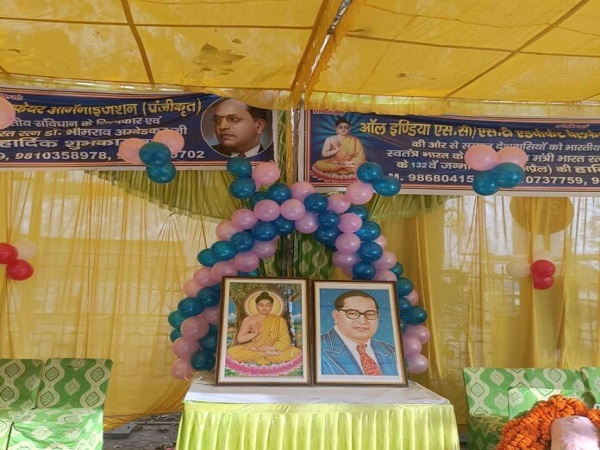Every year lakhs of Dalits, Bahujan and Adivasi gather at Parliament Street in Delhi along with their allies to celebrate the birth date of Dr. B.R. Ambedkar- the revolutionary Indian statesman and intellectual. Thus, 14th April marks a moment of assertion, solidarity, and love for all the subaltern communities and is celebrated around the globe. From book stalls, theatre and performance, distribution of food, et al., the site is filled with pomp and show throughout the day. It revels in a unique paradigm where Brahmanical hierarchy and a normative civic imposition are challenged each minute. There is a cultural as well as a political significance to these communitarian acts of celebration and expression. This photo essay delves further into such acts.
Many SC ST wings of government organisations set up a stall and distribute food and books for free or at a minimal cost during the day. They also acknowledge the service of their employees to the movement and organisation. These stalls act as a platform to give voice to the experience of the employees and their families to the cause of nation building.
Many such artworks of Babasaheb, Buddha and cultural symbols like the elephant that are made by the artisans of marginalised communities are sold at Parliament Street to mark the occasion.
A 3D digital painting of Dr. B.R. Ambedkar with a halo around his head and the Indian Constitution in his left hand, standing beneath the Buddha alongside the Lion Capital and the Ashoka Chakra.
Three women sanitation workers at Parliament Street engaged in a conversation. The task of sweeping the city streets is performed by Dalit communities.
Many posters, books and handmade cultural objects abound during the celebration. The pictorial signification encodes a political message of equality and valour. The authors and artists often hail from subaltern communities and work on indigenous narratives.
Ambedkar and Buddha's sculptures were set up on the stage for the social activists, students and workers to garland. There is also a sculpture of the Constitution of India and a blue Ambedkarite flag bearing the greeting, Jai Bhim. Buddhist monks also participate in the occasion.
Products of daily use like tea, clothing items and certain necessary commodities are also sold at a discounted price at the site, often with an indigenous tag signifying entrepreneurship and business.
Pens, posters, books, lapel pins, gate cards, wallet photos, small busts and statues, key rings, and other decorative items with the imagery of Ambedkar and other anti-caste leaders.
Replication with local material and techniques of the iconic Ambedkar statues with a finger raised in the air were also displayed.
Source: Two Circle
0 COMMENTS



